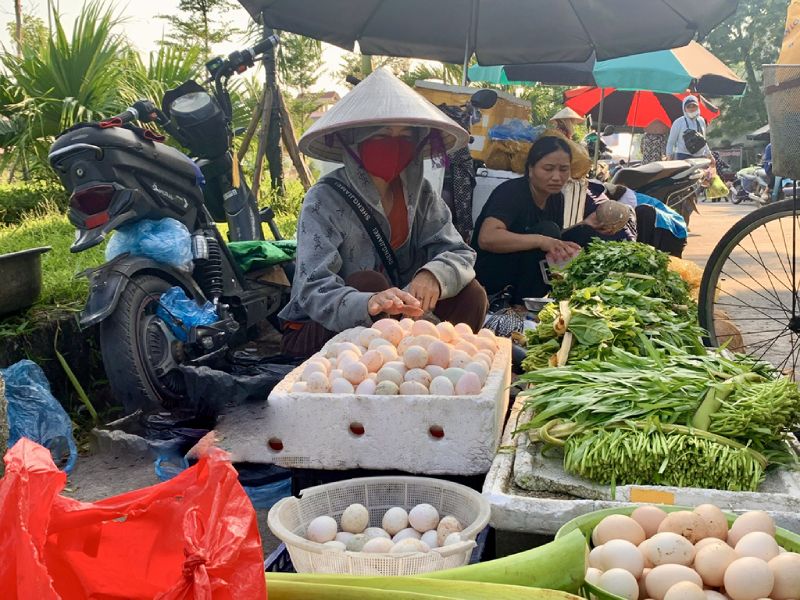After a long period of hitting “rock bottom,” poultry egg prices have rebounded in recent months, bringing joy to many farming households. This is not only a positive signal that helps farmers partially recover their losses, but also opens up hopes for stability in the province’s poultry farming sector.
Egg prices rise, farmers earn big profits but still worry about a “boom-and-bust” cycle
At Gao Market in Pho Hien Ward, since early June, poultry egg prices have risen across the board. Currently, red chicken eggs are sold at 3,000 VND each, Egyptian chicken eggs at 3,500 VND each, duck eggs from 3,000 – 3,500 VND each; the highest are native chicken eggs at 4,000 – 4,500 VND each. According to traders, within just two months, egg prices have increased by 20 – 35% compared to the end of May.
At laying hen farms, the atmosphere has also become less gloomy after months of hardship. The family of Mr. Nguyễn Hữu Tuệ, in Duong Phu Hamlet, Luong Bang Commune, runs a farm with a total flock of 35,000 Egyptian chickens. Each day, the farm produces about 30,000 eggs. Mr. Tuệ shared: “Last year, egg prices sometimes dropped to only 1,500 – 1,700 VND per egg, and even fell to 1,300 – 1,400 VND per egg early this year. Some months, my family lost 400 – 500 million VND. But since June, egg prices have picked up, currently at 2,700 – 3,000 VND per egg, which has greatly eased our burden.”
Mr. Tuệ’s farm follows the VietGAHP process, and its eggs have earned a 4-star OCOP certification, with clear traceability labels. Thanks to this, his eggs are smoothly distributed through many store systems. According to his calculations, the current production cost is about 1,800 VND per egg; at selling prices of 1,900 VND or higher, farmers can make a profit.
 Currently, poultry egg prices at markets across the province have increased by 20–35% compared to May
Currently, poultry egg prices at markets across the province have increased by 20–35% compared to May
Similarly, the family of Mr. Hoàng Văn Mười in Long Hung Commune is also delighted as his flock of 10,000 chickens produces about 7,000 eggs per day, now being sold at much higher prices than before. Mr. Mười shared: “For a long time, we suffered losses, and many households had to shut down their farms. Now that egg prices have risen and the market has improved, we are more motivated to stick with the job.”
Not only chicken eggs but also duck eggs have seen a sharp price increase recently, bringing significant income to many farming households. The family of Mr. Bùi Duy Đào in Kim Quan Hamlet, Khoai Chau Commune, currently raises 3,000 laying ducks, harvesting around 2,500 eggs per day. Over the past two months, egg prices have surged, now at 2,800 VND per regular duck egg and 3,300 VND per fertilized duck egg—an increase of about 600 VND per egg compared to the beginning of the year. At these prices, each egg yields a profit of 500 – 700 VND, giving farmers a reason to be optimistic.
Traders have also noted the market’s recovery. Mr. Nguyễn Văn Quyết, an egg collector in Yen My Commune, said: “Each day I handle about 20,000 poultry eggs of various kinds, supplying both the local market and nearby provinces and cities such as Hanoi, Bac Ninh, and Quang Ninh. Egg prices have gone up, and the market overall is much more vibrant.”
According to the Livestock and Veterinary Sub-department (under the provincial Department of Agriculture and Environment), the rise in egg prices in recent months stems from several factors. First, concerns over “fake chicken eggs” that once worried consumers have now been dispelled, helping restore market confidence. In addition, after a long period of low prices, many farmers were forced to downsize their flocks or stop production altogether, leading to a sharp decline in supply. Meanwhile, domestic demand has risen, especially during the peak season when mooncake producers purchase large quantities of eggs. Furthermore, egg exports to Cambodia, Laos, and some Middle Eastern countries have also recovered thanks to more competitive pricing.
Another factor driving egg prices is the shift in consumer habits. The resurgence of African swine fever has reduced pork consumption, prompting consumers to turn to alternative foods such as poultry and eggs. This increased demand has further supported egg prices at favorable levels.
Statistics show that Hung Yen Province’s poultry population currently stands at about 23.4 million birds. With this scale advantage and the adoption of biosecure farming practices by many households, Hung Yen’s eggs are gradually strengthening their position in the market.
Although egg prices are in a recovery phase, authorities advise farmers not to rush into expanding their flocks to avoid risks when the market fluctuates. Instead, they should focus on improving product quality, ensuring biosecurity, and maintaining traceability to meet the increasingly high standards of consumers. Poultry farming is inherently cyclical, so farmers need to view it as a long-term production activity—avoiding the pattern of expanding when prices rise and abandoning when they fall. By maintaining stability, high-price periods can offset the lows, balancing annual costs and minimizing the risk of losses.
Huong Giang
Source: Hung Yen Newspaper
